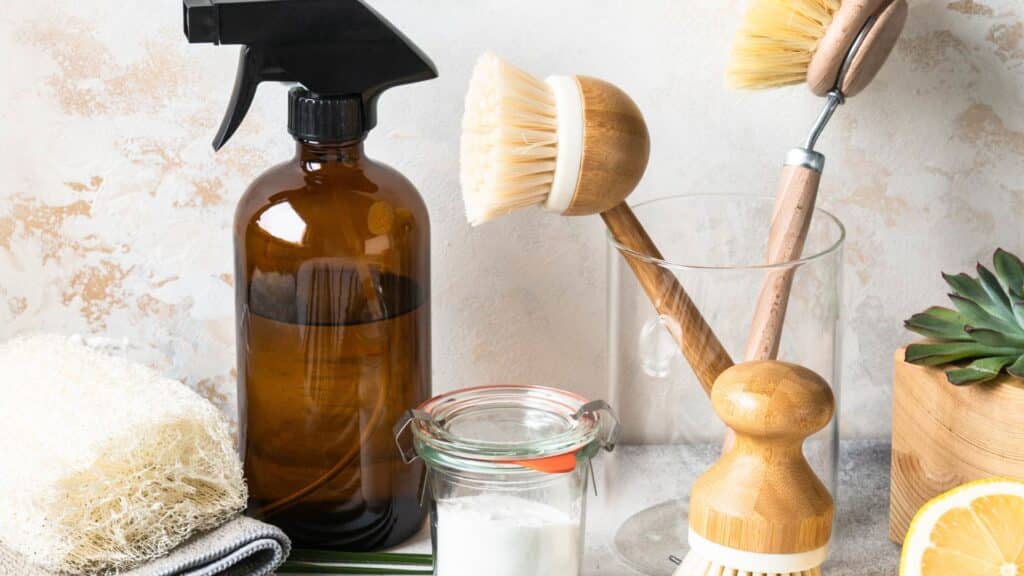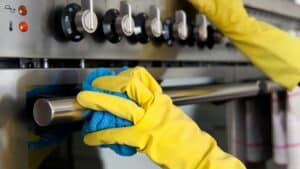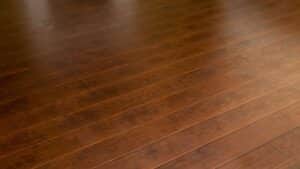The best way to clean an oven is to create a paste of baking soda and water, apply it inside the oven, and let it sit overnight. The next day, wipe away the paste, then spray a vinegar-water solution to remove any remaining residue. For tough grime, commercial oven cleaners are effective but require safety precautions. Regular maintenance, like wiping spills after use and deep cleaning every few months, is also crucial.
Preparation for Cleaning

Safety should always be your priority. Begin by unplugging your oven or turning off the gas supply to avoid any accidents. Wear protective gloves and, if using strong cleaning agents, consider a mask to avoid inhaling fumes.
Start by removing the oven racks and any other removable components. These will be cleaned separately. A preliminary wipe-down to remove crumbs and loose debris will make the deep-cleaning process more straightforward.
Natural Cleaning Solutions

For those who prefer eco-friendly solutions, natural ingredients like baking soda, vinegar, and lemon are not only safe but remarkably effective in dealing with grease and burnt-on food.
Baking Soda Paste: Mix half a cup of baking soda with water to create a paste. Spread this paste inside the oven, targeting particularly grimy areas. Let it sit overnight. The following day, wipe off the paste with a damp cloth and spray a little vinegar in areas where you see baking soda residues. The vinegar will react with the baking soda to foam, making it easier to remove the last bits of grime.
Lemon Steam Clean: If your oven is not heavily soiled, a steam clean with lemon can be refreshing. Place an oven-safe bowl filled with water and lemon slices in the oven. Heat at a moderate temperature for about 30 minutes. The steam will help loosen the dirt, making it easier to wipe away.
Chemical Cleaning Agents

For tougher grime, commercial oven cleaners (Oven Whiz Cleaner Oven and Grill Cleaner and Commercial Oven, Grill and Fryer Cleaner ) can be a potent solution. These chemical agents are designed to break down baked-on food residue and grease effectively. When using them, it’s crucial to ensure good ventilation in the kitchen and to wear protective gloves and possibly a mask, as these cleaners often emit strong fumes.
How to Use: Generally, you’ll spray or apply the cleaner inside the oven, focusing on the dirtiest areas. Let it sit as per the instructions – usually for a period ranging from 20 minutes to a few hours. Then, wipe the oven clean with a damp cloth. Ensure that all residues of the cleaner are removed before using the oven again.
Pros
- Highly Effective: Chemical cleaners are very effective at breaking down and removing tough, baked-on grime and grease.
- Time-Efficient: They work relatively quickly, especially on very dirty surfaces, reducing the amount of scrubbing and effort required.
- Convenient: Ready to use with minimal preparation needed; simply apply, wait, and wipe off.
Cons
- Strong Chemicals: These cleaners often contain harsh chemicals that can be harmful if inhaled or if they come into contact with skin.
- Environmental Concerns: Many chemical cleaners are not eco-friendly and can be harmful to the environment.
- Residue and Odor: They can leave behind residues and strong odors that might require thorough ventilation and rinsing.
- Not Suitable for All Oven Types: Certain chemical cleaners may not be appropriate for all types of ovens, such as self-cleaning or continuous cleaning ovens.
- Safety Precautions Needed: Requires wearing protective gloves and ensuring good ventilation during use to avoid health risks.
Cleaning Self-Cleaning Ovens

Self-cleaning ovens come with a feature that allows them to clean themselves at very high temperatures. While this sounds convenient, there are certain precautions and steps to follow.
How It Works: When you activate the self-cleaning cycle, the oven locks itself and heats up to a very high temperature, turning any food residue to ash.
Guidelines for Use
Remove all oven racks and any large pieces of food debris before starting the cycle. Once the cycle is complete and the oven is cool, wipe away the ash with a damp cloth. Avoid using oven cleaners or abrasive materials on these types of ovens, as they can damage the interior lining.
Cleaning Oven Racks and Other Components

Oven racks and other removable parts require special attention. Soak the racks in a solution of hot water and dish soap or a mixture of baking soda and vinegar.
This soaking will help loosen the grime, making it easier to scrub off with a sponge or a steel wool pad for tougher residues.
Maintenance Tips
- Regular Wiping: After each use, once the oven cools down, wipe the interior to remove any spills or splatters. This prevents buildup over time.
- Deep Cleaning Schedule: Plan to deep clean your oven every 3-6 months, depending on usage, to prevent the accumulation of grease and burnt-on food residues.
- Immediate Spill Cleanup: If spills occur during cooking, clean them up as soon as the oven is cool enough to safely wipe them away.
- Use Oven Liners: Consider using oven liners or aluminum foil at the bottom of the oven to catch drips, but be sure to follow your oven manufacturer’s guidelines to avoid obstructing airflow.
- Regular Rack Cleaning: Remove and clean the oven racks separately. Soaking them in soapy water can help loosen grime.
- Check and Replace Oven Gaskets: Regularly inspect the oven door gasket for wear and tear. A damaged gasket can lead to heat loss and inefficient cooking.
- Avoid Excessive Use of Harsh Chemicals: Frequent use of harsh chemicals can damage the interior surface of the oven over time. Use gentler, natural methods when possible.
- Proper Usage of Oven Settings: Use the appropriate settings for different types of cooking to avoid unnecessary mess and ensure even cooking.
- Ventilation: Ensure good kitchen ventilation to avoid moisture buildup inside the oven, which can lead to mold or mildew.
- Consult the Manual: Regularly refer to your oven’s manual for specific maintenance tips and cleaning instructions tailored to your oven model.
Final Verdict
Cleaning your oven is a vital part of kitchen maintenance. Whether you choose natural methods or chemical solutions, keeping your oven clean will ensure it operates efficiently and your food tastes as it should.
Remember, the best cleaning method depends on your oven type and your personal preference. Regular care and maintenance can save you time and effort in the long run.




